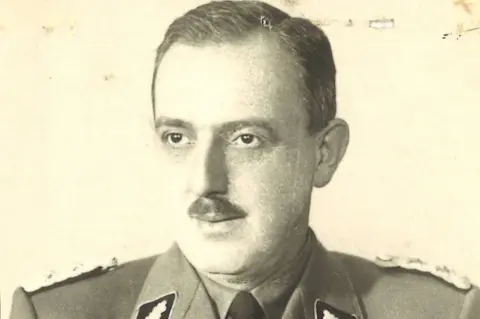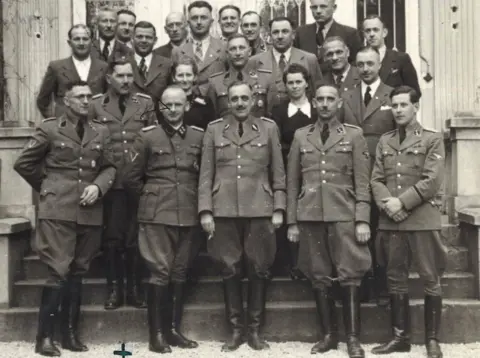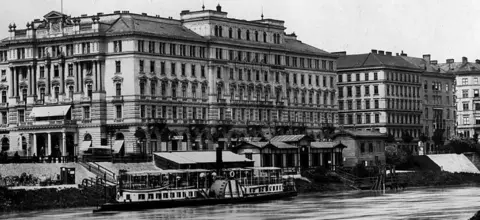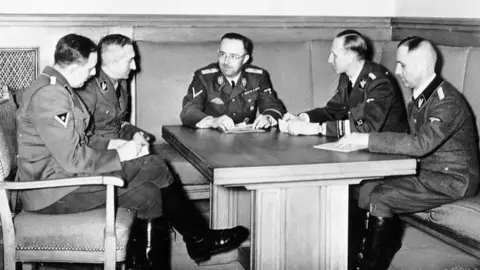Huber case: Nazi police chief in Vienna spied for West Germany
 National Archives of Slovenia
National Archives of SloveniaA Nazi SS general responsible for deporting tens of thousands of Jews to death camps worked for West German intelligence after World War Two, shielded from prosecution.
The protection given to Franz Josef Huber was revealed by the German spy service BND, in archives seen by German public broadcaster ARD.
Huber ran the Gestapo in Vienna, the Nazis' second-biggest secret police HQ after Berlin.
The US military knew about his crimes.
Huber took charge of the Gestapo in Vienna immediately after Adolf Hitler annexed Austria in March 1938 and held that post until late 1944.
Adapt and survive
When the Allies occupied the disintegrating Nazi Reich, Huber was on a US wanted list and was arrested by US forces in May 1945.
He was detained for nearly three years, but the US military found him to be co-operative and released him in 1948, so he escaped prosecution for war crimes, the New York Times reports. The paper was given access to ARD's material.
BND historian Bodo Hechelhammer told ARD that at that time "the Cold War was looming, so above all they were of course looking for hardline anti-communists.
"Unfortunately all too often they searched for, and found, such types among former Nazis."
From 1955 to 1967 Huber was employed by West German intelligence, the BND. Originally it was the Gehlen Organisation, headed by ex-Nazi officer Reinhard Gehlen, who had run agents on the Eastern Front.
Huber was pensioned off in 1967, as the BND had concluded that he could not be kept on, lest his role "endanger the service". He drew a German civil service pension, but also worked for an office equipment company, living under his own name in Munich until his death aged 73.
Among Nazi elite
In Nazi-run Austria Huber worked hand-in-hand with Adolf Eichmann, who set up the Central Agency for Jewish Emigration in Vienna. It handled the mass deportation of Jews.
 National Archives of Slovenia
National Archives of Slovenia
One of Huber's first jobs as Gestapo chief in Vienna was to send Jewish community leaders to Dachau concentration camp near Munich. Before joining the Nazi Party in 1937 he had been a senior police officer in Munich, his native city.
About 65,500 Austrian Jews - most of them Viennese - were murdered in the Holocaust.
After the war Israeli agents captured Eichmann - one of the key organisers of the Holocaust - in Argentina. He was tried in Israel and executed in 1962.
Huber had a Gestapo staff of 900 in Vienna. An estimated 50,000 people were brutally interrogated by them there, at the notorious Hotel Métropole. The hotel, one of Vienna's finest before its seizure by the Nazis, had opened in 1873 at Morzinplatz. It was demolished by explosions in 1945 when Soviet forces occupied the city.
 Getty Images
Getty ImagesThe overall Gestapo chief was Heinrich Müller, who was in the Berlin bunker during Adolf Hitler's last days, but then disappeared in 1945. His fate is still unknown.
A report from the US government archives reveals that, when questioned by the US occupation forces, Huber admitted visiting several concentration camps: Dachau in 1936, Sachsenhausen in 1936, and Mauthausen in 1939.
"But, he said, he had never seen any cruelty there, that the laws of humanity were always his highest rule of conduct," the report, called Hitler's Shadow, says. In fact, inmates of those camps were beaten, starved and tortured by SS guards, and few survived.
Photos from 1941 in the German state archives (Bundesarchiv) also show Huber at Mauthausen in the entourage of SS commander Heinrich Himmler.
 Getty Images
Getty ImagesIn 1945, a German denazification tribunal in Nuremberg acquitted Huber of all responsibility for crimes, the report says. Yet Nuremberg was where some Nazi leaders were tried by the Allies and 10 were executed in 1946.
The US military's main interest in Huber at the time was in trying to locate fugitive Gestapo chief Müller. Huber's work for West German intelligence began after his release from US custody.
Stefan Meining, a historian involved in the ARD research, says the BND "knew exactly that Huber was not some petty Gestapo murderer but an SS general, who moved within the innermost circles of the Nazi terror apparatus and was responsible for the deaths of tens of thousands of Jews and opponents of the regime".
